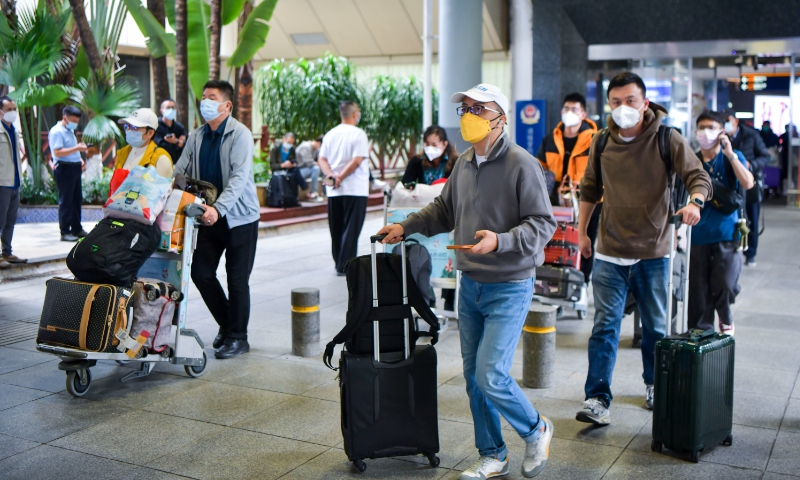
Passengers walk out of Haikou Meilan International Airport on December 9, 2022. Photo: VCG
On January 6, 2023, China's National Health Commission (NHC) and National Administration of Traditional Chinese Medicine issued China's 10th edition of its diagnosis and treatment protocol for novel coronavirus infection. This is the NHC's first national guiding protocol after China announced to downgrade management of COVID from Class A to Class B from January 8. Two items are worth noting here: the definition has changed from "novel coronavirus pneumonia" to "novel coronavirus infection" and its classification is now at a "B" level. The classification has significant implications for the measures taken to deal with the virus, but a question arises: Has China "lain down" before the virus, has it given up on dealing with it? The answer is a resounding no. Instead, China is the first country in the world to move from the coronavirus being a pandemic to it being endemic. This point needs some explanation.
First, for a little over three years I have been closely following China's approach in dealing with the COVID-19 pandemic. The results have been nothing less than stunning: the number of per capita infections and deaths are at the lowest level in the world, life expectancy has increased during this time, and the dialectic of economic development and public health has been managed very well.
The health of the population has not been significantly compromised - as has happened in some other countries - by the earlier and more toxic mutations of the virus, and the level of full vaccinations among the population above 3 years old is over 90 percent. In many respects, China has set a new "gold standard" for dealing with a pandemic. As one example, I have noted the huge amount of discussion with each revision of the measures for dealing with the pandemic, seeing how medical specialists and scientists were dealing daily with the many questions people had. The specialists were always "on message," seeking to explain the content, connotations, implications, and reasons behind each revision of the measures. Friends and colleagues in China gave me regular updates concerning the experiences with their own families, their workplaces, their concerns, and - most importantly - their hopes.
This leads to the second point: the "people-centered approach," or "taking the people as the center." While this has been a core position of the CPC, a people-centered approach has seen renewed emphasis in the new era since the CPC's 18th National Congress in 2012, when Xi Jinping was elected general secretary of CPC Central Committee. During the pandemic, this approach became absolutely central, expressed in "people come first, and life comes first," which has been the commitment of the CPC to the whole Chinese people since the first days of the pandemic. Without the health of the people, development and a moderately well-off society is not comprehensive, or is not complete is all respects.
Third, an international observer cannot avoid noticing how all of the policy measures are based on rigorous and comprehensive science. For example, on December 15, 2022, I listened to a two-hour lecture by Zhong Nanshan, the "hero of SARS" and recipient of the Medal of the Republic, China's highest state honor, for his services in fighting the COVID pandemic. The lecture has been watched by tens of millions of people across China, since it explains the immense amount of science that is behind China's huge success in dealing with the pandemic. Zhong Nanshan's lecture summarised much of the science, but this requires an immense amount of evidence, research, and collaboration between scientists, in China and across the world. For example, it is precisely because China has undertaken such comprehensive testing that we know now that 90 percent of Omicron infections are asymptomatic and that those who are symptomatic are mostly mild. Only rigorous science produces such results. Zhong Nanshan's message was very clear: Do not get infected but do not be afraid of the virus in its Omicron form.
Fourth is the comprehensive approach. As we well know, departmentalism is typical of the few Western societies, with their individualism and liberalism. The result has been that their "single solution" approach to the pandemic was an obvious failure. By contrast, one finds again and again that China takes a comprehensive approach: Health and economic development; all effective measures for ensuring a healthy population, and so on. For example, one's risk of infection or reinfection is very low with mixed vaccines (especially deactivated and adenovirus-based vaccines), Traditional Chinese Medicine, wearing quality face-masks, opening windows regularly, focusing on the elderly and children, and maintaining a high level of attention with disinfected surfaces. Clearly, this is a comprehensive approach, considering all aspects of what is effective. It is in this sense that we can see how China is the first country in the world where the coronavirus is moving from a pandemic to an endemic - and thus seasonal and non-threatening - status. Yes, China is stepping out of the pandemic, with 1.4 billion people. This is a momentous achievement and I am waiting eagerly to see how 2023 unfolds.
Fifth, I am struck by the way that China has identified where and how the health system can be improved. This feature always impresses me about China: no matter how good a practice may be, there is always room for improvement. This is also true with the all-important health system. It goes without saying that the improvements are comprehensive, leveraging the strengths of grassroots health services through to the highest research hospitals. As others have observed, with the lessons learned from the last three years, China's health system has seen impressive improvement.
By now it should be obvious why China is stepping out of the pandemic, and why the coronavirus has become endemic. I would like to conclude on a note of hope. As I have been engaging with friends and colleagues in China, I have seen a distinct hope and eagerness as 2023 begins. People are very much looking forward to returning to their home towns for the Spring Festival, which for many will be the first time in three years. All of this has also given me hope and put me in a very good mood, since I know that in 2023 I will finally be able to return to China.
The author is a Marxist scholar from Australia, distinguished overseas professor at Renmin University of China, and on editorial board of the Australian Marxist Review. opinion@globaltimes.com.cn

